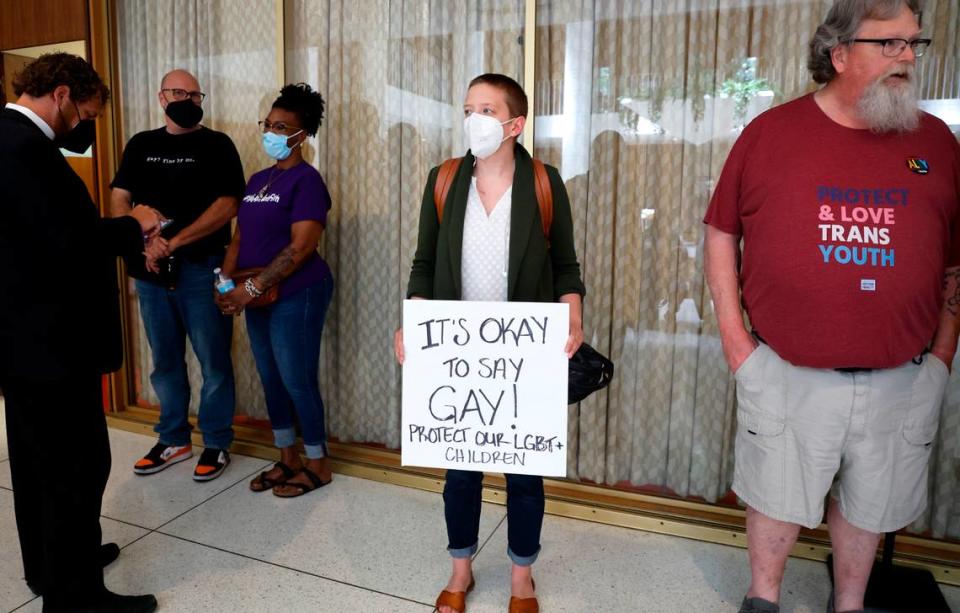North Carolina’s ‘Parents’ Bill of Rights’ puts LGBTQ kids at risk | Opinion
At the end of the day, North Carolina’s so-called Parents’ Bill of Rights isn’t really about giving parents more control over their child’s education.
It’s about telling LGBTQ kids, especially trans kids, that they don’t matter.
That is the impact, whether Republicans originally intended it to be or not. But it’s certainly intentional now, considering they have ignored the many parents, community members, experts and advocates who have voiced concerns about the bill over the past week. They voiced the same concerns last year, when Republicans first brought the bill to the floor.
As GOP lawmakers fast-track the bill through the Senate and onto the House, they’ve been careful to frame it as common sense legislation. According to the bill’s sponsors, the provision that bans instruction on sexuality or gender identity in most elementary school classrooms only exists to ensure “age-appropriate instruction.” A requirement that schools notify parents when a student asks to change their name or pronouns — or if there are changes in their “mental, emotional, or physical health or well-being” — is supposedly just about communication and transparency.
The reality is far more grim.
As experts have pointed out, forcing teachers and school administrators to out kids to their parents against their will is dangerous. Oftentimes, students who are questioning their sexuality or gender identity just need someone to confide in, and school may be the only place where they feel safe enough to do so. Not every parent is supportive of their child’s sexual orientation or gender identity, and having a supportive teacher or coach who can affirm their identity can be life-saving.
The bill goes beyond state law, which already gives that parents access to their child’s academic record. In some cases, such as if a student shares that they are struggling with their identity, teachers would have to disclose what a student tells them in confidence. That’s altogether different than a parent’s right to a child’s academic record. It’s compelling an educator to tell a parent the details of a private conversation.
In the classroom, North Carolina’s parental rights bill doesn’t explicitly forbid teachers from even mentioning gender identity or sexuality, but it doesn’t necessarily have to. The way the bill is written is vague and ambiguous enough to cause teachers to self-censor, opting for silence because they’re unsure of what exactly is permitted and what isn’t. Since “Don’t Say Gay” legislation was passed in Florida, confusion over what exactly constitutes “instruction” has had a chilling effect — teachers aren’t sure whether they can hang rainbow flags in their classroom, or talk about their same-sex partners with their students.
At a recent press conference about North Carolina’s bill, one reporter asked whether the bill would allow teachers to read a book about a family with two dads. The bill’s sponsors wouldn’t give a straight answer.
“It baffles me to think that this bill could be divisive,” Sen. Amy Galey, one of the bill’s primary sponsors, said. “Quite frankly I cannot understand why it would be controversial to say that children five, six, seven, eight, nine years old should not be taught about sexuality, sexual activity in public school classrooms. That blows my mind.”
The idea that kids are being “groomed” or taught about sexual activity in kindergarten is as much of a myth as voter fraud. And as a result, Republicans have created a restriction that’s far worse than the actual problem. It hurts kids when we suggest that having two dads is taboo and shouldn’t be discussed, or that how they choose to identify is inappropriate. It hurts kids when we don’t expose them to diversity or teach them to celebrate it.
The Parents’ Bill of Rights may not become law in North Carolina — the governor is highly unlikely to sign it, and it’s unclear whether Republicans will ever have the one vote they need to override his veto. Still, it sends a message to the LGBTQ community that in order to safely exist in the world, in order to be acceptable and appropriate, they have to hide or stay silent.
Promoting a safe, inclusive educational environment in which kids of all identities can thrive isn’t indoctrination — it’s just the right thing to do. Republicans say they are “protecting” students and parents, but it does so at the expense of kids who actually need that protection. LGBTQ people matter, and their well-being is no less important than anyone else’s.
This bill tells them the opposite.



